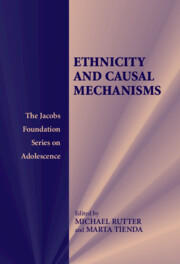Book contents
- Frontmatter
- Contents
- List of Contributors
- Foreword
- Preface
- 1 Natural Experiments, Causal Influences, and Policy Development
- 2 Growing Up Ethnic in the United Kingdom and the United States: Comparative Contexts for Youth Development
- 3 The Multiple Facets of Ethnicity
- 4 Educational Attainments: Ethnic Differences in the United Kingdom
- 5 Race and Ethnic Inequality in Educational Attainment in the United States
- 6 Racial and Ethnic Disparities in Crime and Delinquency in the United States
- 7 Explaining Ethnic Variations in Crime and Antisocial Behavior in the United Kingdom
- 8 Cultural Differences in the Effects of Physical Punishment
- 9 Ethnicity and Mental Health: The Example of Schizophrenia in the African-Caribbean Population in Europe
- 10 Ethnic Variations in Youth Suicide
- 11 Ethnicity and Intergenerational Identities and Adaptations in Britain: The Socio-Political Context
- 12 Assimilation, Dissimilation, and Ethnic Identities: The Experience of Children of Immigrants in the United States
- 13 Deciphering Ethnicity: Reflections on Research Opportunities
- Author Index
- Subject Index
4 - Educational Attainments: Ethnic Differences in the United Kingdom
Published online by Cambridge University Press: 05 July 2014
- Frontmatter
- Contents
- List of Contributors
- Foreword
- Preface
- 1 Natural Experiments, Causal Influences, and Policy Development
- 2 Growing Up Ethnic in the United Kingdom and the United States: Comparative Contexts for Youth Development
- 3 The Multiple Facets of Ethnicity
- 4 Educational Attainments: Ethnic Differences in the United Kingdom
- 5 Race and Ethnic Inequality in Educational Attainment in the United States
- 6 Racial and Ethnic Disparities in Crime and Delinquency in the United States
- 7 Explaining Ethnic Variations in Crime and Antisocial Behavior in the United Kingdom
- 8 Cultural Differences in the Effects of Physical Punishment
- 9 Ethnicity and Mental Health: The Example of Schizophrenia in the African-Caribbean Population in Europe
- 10 Ethnic Variations in Youth Suicide
- 11 Ethnicity and Intergenerational Identities and Adaptations in Britain: The Socio-Political Context
- 12 Assimilation, Dissimilation, and Ethnic Identities: The Experience of Children of Immigrants in the United States
- 13 Deciphering Ethnicity: Reflections on Research Opportunities
- Author Index
- Subject Index
Summary
Introduction
Immigration of non-White ethnic minority groups to the United Kingdom is a largely post-World War II phenomenon. The first main waves of migrants arrived from the Caribbean in the late 1940s and 1950s; less than two decades later, African-Caribbean communities were expressing concern over their children's school achievements, and by 1979 an official Committee of Enquiry had been established to report on the educational needs and attainments of children of Caribbean origin. Subsequent waves of immigration, predominantly from south Asia and Africa, have been followed by further concerns, but also by awareness of the diversity in patterns of attainment that has emerged: most second-generation minority groups have made marked progress by comparison with the migrant generation, and by the mid-1990s some of the most, as well as the least, positive school achievements were recorded by young people from minority communities.
This chapter examines recent evidence on the attainments of ethnic minorities in the United Kingdom, and the factors thought likely to influence them. First, to set the empirical findings in context, it provides a brief overview of patterns of immigration to Britain in the second half of the twentieth century, and the geographical location and economic and social status of minority groups in the current population. Second, it reviews recent empirical evidence on the attainments of minority children and young people at different stages in the educational process, from entry to primary school to involvement in further and higher education.
- Type
- Chapter
- Information
- Ethnicity and Causal Mechanisms , pp. 80 - 106Publisher: Cambridge University PressPrint publication year: 2005

